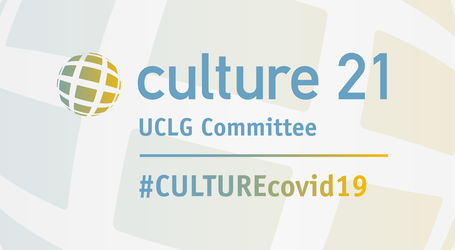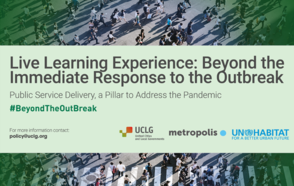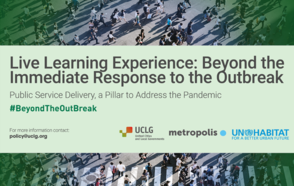
The humanity is facing an enormous challenge. The COVID-19 crisis has an impact in all dimensions of our lives: the public health, the labour systems, the social interaction, the political debate, the use of public spaces, the economy, the environment, and the cultural life.
COVID-19 is hitting the cultural life of our communities very severely. Libraries, memorials, community centres, museums and all cultural venues are closing… Performances, festivals, parades, carnivals and intangible heritage events are cancelled. Workers in the sectors, who are often in an already precarious situation (self-employed, freelancers) may be left for months without any income. The active involvement of all in the cultural life of the community is very damaged by COVID-19, and so is the welfare and the quality of our democracies.
This page is updated periodically by the UCLG Culture Committee here, and updates are shared on Twitter on the Committee on Culture account (@agenda21culture) using the tag #CULTUREcovid19.
This page is part of the "Live Learning Experience: beyond the immediate response to the outbreak", developed by UCLG. The Culture Committee of UCLG does not necessarily share the views of actors, authors, networks and organizations listed below.
1. Follow the action of cities and local governments
Cities and local governments are struggling to guarantee the cultural rights of all. Cities and local governments, with their workers, actors and institutions, are making tremendous efforts to maintain activities to ease people’s feeling of isolation:
- creating new possibilities to access heritage and knowledge and to participate in online cultural events
- providing new training and capacity-building programmes to support the cultural circles (example: fund-raising)
- supporting the presence of cultural institutions in internet and social media
- exploring new ways to organise the cultural work
- advocating to protect the cultural life, the sectors and the actors with special funds
Some examples of the actions undertaken are listed below:
· Mexico City: Estrategias para que la cohabitación a distancia y la solidaridad puedan derrotar a la enfermedad.
· Buenos Aires: Cultura en casa, a new programme every day so that you are at the centre of the cultural community.
· Lisboa: Measures and informations on COVID-19, including the series “Herois da cidade”
· Rome: the initiative #iononmiannoio and the initiative #laculturaincasa, which includes access and digital resources of libraries, virtual tours of museums, the contest #FinestresuRoma, as well as live online music, theatre and opera performances.
· Barcelona: New measures to support cultural organisations and artists.
· Hong Kong: new support Scheme for Arts & Cultural Sector.
· Austin: Artists Emergency Relief Fund (via National Endowment for the Arts).
· Bulawayo: Nhimbe Trust creates a Cultural and Creative Industries Obsevatory for COVID-19.
· Boston: Artist Relief Fund.
· New York: the manifesto of the People’s Culture Plan.
· Minneapolis: Survey to analyse the impact of COVID-19.
· Berlin: new measures to support cultural organisations and artists.
On the fundamental role of cities in this crisis:
· El futuro inmediato del virus lo deciden las ciudades, by Napoleón Suárez Méndez
2. Initiatives of the cultural networks
· IFLA – International Federation of Library Associations updates a FAQs page on the crisis.
· ICOMOS – International Council on Monuments and Sites monitors the situation in this page.
· IFACCA has created a page with resources on the global crisis.
· Culture Action Europe has written a manifesto and an open letter to the EU, in which it urges the EU to make the 25 billion emergency package to Europe’s economy also available to the arts and culture sector.
· ENCATC and the Réseau de coopération des acteurs du patrimoine culturel en Pays de la Loire are preparing a survey to explore the impact of crisis.
· On the Move and Circostrada have elaborated an impressive list of resources on art, culture and cultural mobility.
· The European section of the International Music Council has released a communiqué and a survey on the impact on the music sector.
3. Manifestos, resources, analysis of impact and more
· Unesco is using the tags #ShareCulture #ShareEducation #ShareSciences #ShareKnowledge #ShareInformation to contribute to defeating #COVID19
· The SDG Action Awards have just opened the call for entries and created a new category on global solidarity.
· The “Cultural Rights Defenders” report by Karima Bennoune, the UN Special Rapporteur on Cultural Rights, is an excellent reference to frame future actions.
· European Cultural Foundation, calling for a culture of solidarity
· Arts Professionals has created a microsite to make these uncertain times more tolerable by sharing news, ideas and resources
· Arts Council of England measures on COVID-19.
· The Facebook-based Cultural Policy Researchers Forum is analyzing ways to react to the crisis.
· The French Observatoire des Politiques Culturelles elaborates a newsletter with news on COVID-19 and provides free access to its revue.
· A huge list of resources for creatives around the globe, created by @Booooooom (via @Colossal).
· Rafael Paredes solicita construir un repertorio de buenas prácticas de gestión cultural.
· The European Commission asks beneficiaries of the Creative Europe Programme to showcase their art work using #CreativeEuropeAtHome
· The Nayong Pilipino Foundation (a national government body) launched a survey to assess the impact of COVID-19 in the arts and culture sector in the Philippines.
· Germany unveils $54 billion aid package for cultural sector hit by coronavirus.
4. Read articles and posts
Interesting articles and posts are published on how the crisis is impacting in our societies (some of them, via François Matarasso, José Luis de Vicente and Olga Subirós.
· “Coranavirus readings”, daily articles compiled by The Syllabus.
· Judith Butler: Capitalism Has its Limits.
· Jane Goodall: video message on COVID-19.
· David Harvey: Anti-Capitalist Politics in the Time of COVID-19.
· Franco Bifo: Diary of the psycho-deflation.
· Naomi Klein: Coronavirus Capitalism — and How to Beat It.
· Byung-Chul Han: La emergencia viral y el mundo de mañana.
· Yuval Noah Harari: La mejor defensa contra los patógenos es la información.
· Daniel Innerarity: Això no és la fi del món, sino la fi d’un món.
· Slavoj Žižek: Monitor and Punish? Yes, Please!
5. The future
New plays, books, music, dances, games… will appear. New rituals and festivals will have to be invented to celebrate human life, and to mourn those who last it.
During the crisis, in confinement, instead of social distancing we should practice physical distancing and social solidarity. Let us also take the moment to stop and reflect, as our friends of Culture Action Europe have suggested, and herewith we adapt and reproduce: in what world do we want to live in after the crisis is over? Are we ready to rethink our collective and individual aspirations regarding our communities and our common goods? Are we ready to take actions to tackle climate change together and to recognise culture’s fundamental role in fair development? Will we be ready to address social inequalities, place welfare at the centre and put solidarity above the immediate economic gains? Instead of going back to business as usual, will we all have the courage to implement drastic systemic changes? If we manage to do it, we will come out of this crisis more united, stronger human beings sharing a truly sustainable 2030 Agenda.
This global crisis proves the need to multiply exponentially the collaboration of all governments as it shows us our interdependence. In these difficult times, the cultural actors (“we”) should promote, more than ever, commitment to the cultural rights of all, and act together so that these rights are protected, promoted, guaranteed and fulfilled.
The times after the covid19
- Simon Mundy: The Great Shutdown – What Will The Arts Do To Bring Cities Back To Life?
- Visit the website of the UCLG Committee on Culture
- Vist the site page BeyondTheOutBreak












